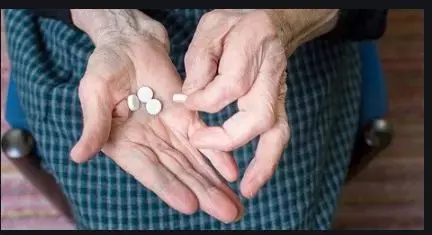- Home
- Medical news & Guidelines
- Anesthesiology
- Cardiology and CTVS
- Critical Care
- Dentistry
- Dermatology
- Diabetes and Endocrinology
- ENT
- Gastroenterology
- Medicine
- Nephrology
- Neurology
- Obstretics-Gynaecology
- Oncology
- Ophthalmology
- Orthopaedics
- Pediatrics-Neonatology
- Psychiatry
- Pulmonology
- Radiology
- Surgery
- Urology
- Laboratory Medicine
- Diet
- Nursing
- Paramedical
- Physiotherapy
- Health news
- Fact Check
- Bone Health Fact Check
- Brain Health Fact Check
- Cancer Related Fact Check
- Child Care Fact Check
- Dental and oral health fact check
- Diabetes and metabolic health fact check
- Diet and Nutrition Fact Check
- Eye and ENT Care Fact Check
- Fitness fact check
- Gut health fact check
- Heart health fact check
- Kidney health fact check
- Medical education fact check
- Men's health fact check
- Respiratory fact check
- Skin and hair care fact check
- Vaccine and Immunization fact check
- Women's health fact check
- AYUSH
- State News
- Andaman and Nicobar Islands
- Andhra Pradesh
- Arunachal Pradesh
- Assam
- Bihar
- Chandigarh
- Chattisgarh
- Dadra and Nagar Haveli
- Daman and Diu
- Delhi
- Goa
- Gujarat
- Haryana
- Himachal Pradesh
- Jammu & Kashmir
- Jharkhand
- Karnataka
- Kerala
- Ladakh
- Lakshadweep
- Madhya Pradesh
- Maharashtra
- Manipur
- Meghalaya
- Mizoram
- Nagaland
- Odisha
- Puducherry
- Punjab
- Rajasthan
- Sikkim
- Tamil Nadu
- Telangana
- Tripura
- Uttar Pradesh
- Uttrakhand
- West Bengal
- Medical Education
- Industry
A rare case of hypercalcemia induced by high doses of Vitamin D, finds study

In a recent research paper, researchers have put forth a case of hypervitaminosis D-induced altered mental status where diagnosis was delayed and additional invasive testing was performed due to an assumption regarding phosphatemia.
The interesting findings have been published in Clinical Nephrology Case Studies.
Hypercalcemia is broadly divided into parathyroid hormone (PTH)-mediated, vitamin D-mediated, and non-humoral etiologies . Classic symptoms of hypercalcemia include altered mental status, constipation, shortened QT interval, muscle weakness, nephrolithiasis, and renal failure . Hypervitaminosis D is an uncommon cause of hypercalcemia, but the use of vitamin D supplementation has expanded and case reports of supplemental vitamin D induced hypercalcemia have become more frequent.
In the recent report, researchers reported a 64-year-old man with a history of chronic obstructive pulmonary disease and ethanol abuse use presented to the emergency department with altered mentation.
Physical exam revealed bilateral upper extremity tremors and obtundation. Lab investigations confirmed hypercalcemia with appropriately suppressed iPTH and low PTHrP resulted in an evaluation for hypervitaminosis D. The patient had an elevated vitamin D 25OHD and normal calcitriol revealing the ultimate diagnosis to be hypervitaminosis D.
Initial management consisted of volume expansion with 3 L normal saline without improvement in mentation. Calcitonin was given on hospital day 2 and zoledronic acid was given on hospital day 3, but hypercalcemia persisted. Further labwork returned with intact parathyroid hormone (iPTH) 17 pg/mL (18 – 80 pg/mL), parathyroid hormone related peptide (PTHrP) 9 pg/mL (pg/mL 14 – 27), serum protein electrophoresis (SPEP) and immunofixation (IFE) without evidence of monoclonal protein, κ light chains 85.4 mg/L (3.3 – 19.4 mg/L), λ light chains 40.8 mg/L (5.7 – 26.3 mg/L), and β-2 microglobulin 3.75 mg/L (0.97 – 2.64 mg/L). The elevation of κ/λ ratio in the setting of a normal glomerular filtration rate prompted evaluation for a monoclonal gammopathy.
The patient remained agitated and confused for the first 10 days of hospitalization, but mentation improved thereafter with calcium normalizing after 18 days.
"This case highlights the importance of having a broad differential for hypercalcemia. We recommend that hypervitaminosis D be considered in patients with hypercalcemia and low PTH regardless of phosphorus level."wrote the research team.
For the full article follow the link: : 10.5414/CNCS110414
Primary source: Clinical Nephrology
Dr Satabdi Saha (BDS, MDS) is a practicing pediatric dentist with a keen interest in new medical researches and updates. She has completed her BDS from North Bengal Dental College ,Darjeeling. Then she went on to secure an ALL INDIA NEET PG rank and completed her MDS from the first dental college in the country – Dr R. Ahmed Dental College and Hospital. She is currently attached to The Marwari Relief Society Hospital as a consultant along with private practice of 2 years. She has published scientific papers in national and international journals. Her strong passion of sharing knowledge with the medical fraternity has motivated her to be a part of Medical Dialogues.
Dr Kamal Kant Kohli-MBBS, DTCD- a chest specialist with more than 30 years of practice and a flair for writing clinical articles, Dr Kamal Kant Kohli joined Medical Dialogues as a Chief Editor of Medical News. Besides writing articles, as an editor, he proofreads and verifies all the medical content published on Medical Dialogues including those coming from journals, studies,medical conferences,guidelines etc. Email: drkohli@medicaldialogues.in. Contact no. 011-43720751


